Reverse Charge Mechanism Under GST
When a supplier collects the tax from the buyer and deposits the same after adjusting his output tax liability with input tax credits its called normal supplies, but under Reverse Charge Mechanism liability to pay tax on a “Specific Supply” is on the ‘Recipient of Supply’. reverse charge under gst
Reverse Charge Mechanism exists in many countries where it is applicable to “Imports of Services and Intangible Properties’. Normally, the supplier pays the tax on supply. In Special cases, the receiver has the liable to pay the tax, thus the chargeability gets reversed and because of that, it is called Reverse Charge Mechanism (RCM).
The main object of this system is to increase tax compliance base and Tax Revenues to the government. in earlier system, it was very difficult to Levy service tax from many unorganized sectors like Goods Transport Agents. Compliances and tax collections will be increased through Reverse Charge Mechanism (RCM).
The concept of reverse charge mechanism was already presented in Service Tax Regime. In GST regime, the reverse charge is applicable for both Goods and Services.
As per section 2(98) of CGST Act’ 2017, “Reverse Charge” means the liability to pay tax by the recipient of supply of goods or services or both instead of the supplier of such goods or services or both
- under sub-section (3) or sub-section (4) of section 9, or
- under sub-section (3) or subsection (4) of section 5 of the Integrated Goods and Services Tax Act
There is two type of Reverse Charge Mechanism Under GST. First is dependent on the nature of supply and/or nature of supplier. This scenario is covered by section 9 (3) of the CGST/SGST (UTGST) Act and section 5 (3) of the IGST Act.
The second scenario is covered by section 9 (4) of the CGST/SGST (UTGST) Act and section 5 (4) of the IGST Act where taxable supplies by any unregistered person to a registered person is covered.
As per the provisions of section 9(3) of CGST / SGST (UTGST) Act, 2017 / section 5(3)of IGST Act, 2017, the Government may, on the recommendations of the Council, by notification, specify categories of supply of goods or services or both, the tax on which shall be paid on reverse charge basis by the recipient of such goods or services or both and all the provisions of this Act shall apply to such recipient as if he is the person liable for paying the tax in relation to the supply of such goods or services or both.
Similarly, section 9(4) of CGST / SGST (UTGST) Act, 2017 / section 5(4) of IGST Act, 2017 provides that the tax in respect of the supply of taxable goods or services or both by a supplier, who is not registered, to a registered person, shall be paid by such person on reverse charge basis as the recipient and all the provisions of this Act shall apply to such recipient as if he is the person liable for paying the tax in relation to the supply of such goods or services or both.
Accordingly, wherever a registered person procures supplies from an unregistered supplier, he needs to pay GST under Reverse Charge Mechanism Under GST.
However, supplies, where the aggregate value of such supplies of goods or service or both received by a registered person from any or all the unregistered suppliers is less than five thousand rupees in a day, are exempted. (Notification 8/2017-Central Tax (Rate) dated 28.06.2017).
However, vide notification no.38/2017-Central Tax (Rate) dated 13.10.2017 (corresponding IGST notification no.32/2017-Integrated Tax (Rate) dated 13.10.2017) all categories of registered persons are exempted from the provisions of reverse charge under 9(4) of CGST / SGST (UTGST) Act, 2017 / section 5(4) of IGST Act, 2017, till 31.03.2018. This exemption is available only till 31.03.2018.
The provisions of section 9(4) of the CGST Act, 2017, will not be applicable to supplies made to a TDS deductor in terms of notification no.9/2017-Central Tax (Rate) dated 28.06.2017. Thus, Government entities who are TDS Deductors under Section 51 of CGST Act, 2015, need not pay GST under reverse charge in case of procurements from unregistered suppliers.
Registration Under GST Reverse Charge Mechanism
A person who is required to pay tax under reverse charge has to compulsorily register under GST
and the threshold limit of Rs. 20 lakh (Rs. 10 lakh for special category states except for J & K) is not applicable to them.
ITC in Reverse Charge Mechanism Under GST
A supplier cannot take ITC of GST paid on goods or services used to make supplies on which recipient is liable to pay tax.
Time of Supply in Reverse Charge Mechanism Under GST
The Time of supply is the point when the supply is liable to GST. One of the factors relevant for determining a time of supply is the person who is liable to pay tax. In reverse charge, recipient is liable to pay GST. Thus time of supply for supplies under reverse charge is different from the
supplies which are under forward charge.In case of supply of goods, time of supply is earliest of –
a) date of receipt of goods; or
b) date of payment as per books of account or date of debit in bank account, whichever is earlier; or
c) the date immediately following thirty days from the date of issue of invoice or similar another document.
In case of supply of services, time of supply is earliest of –
a) date of payment as per books of account or date of debit in the bank account, whichever is earlier; or
b) the date immediately following sixty days from the date of issue of invoice or similar another document.
Where it is not possible to determine the time of supply using above methods, time of supply would be date of entry in the books of account of the recipient.
Compliances in respect of supplies under Reverse Charge Mechanism Under GST:
1. As per section 31 of the CGST Act, 2017 read with Rule 46 of the CGST Rules, 2017, every tax invoice has to mention whether the tax in respect of supply in the invoice is payable on reverse charge. Similarly, this also needs to be mentioned in receipt voucher as well as refund voucher, if tax is payable on reverse charge.
2. Maintenance of accounts by registered persons: Every registered person is required to keep and
maintain records of all supplies attracting payment of tax on reverse charge
3. Any amount payable under Reverse Charge Mechanism Under GST shall be paid by debiting the electronic cash ledger. In other words, reverse charge liability cannot be discharged by using input tax credit. However, after discharging reverse charge liability, credit of the same can be taken by the recipient, if he is otherwise eligible.
4. Invoice level information in respect of all supplies attracting the reverse charge, rate-wise, are to be furnished separately in the table 4B of GSTR-1.
5. Advance paid for reverse charge supplies is also leviable to GST. The person making advance payment has to pay tax on the reverse charge basis.
Supplies of Goods under Reverse Charge Mechanism:


Supplies of services under Reverse Charge Mechanism Under GST:
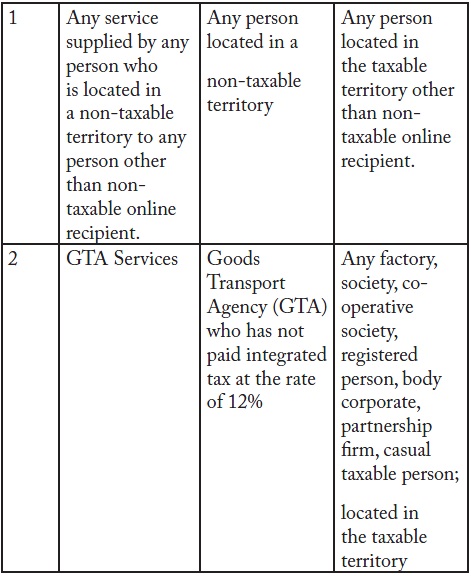
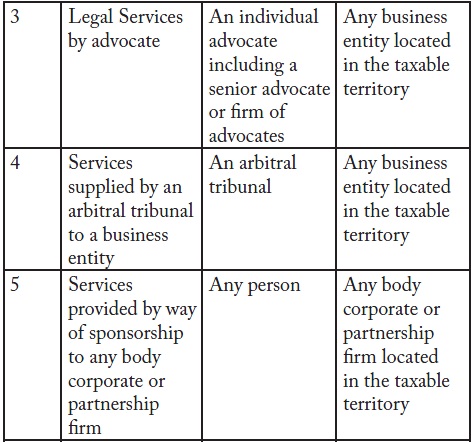
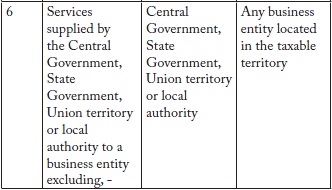
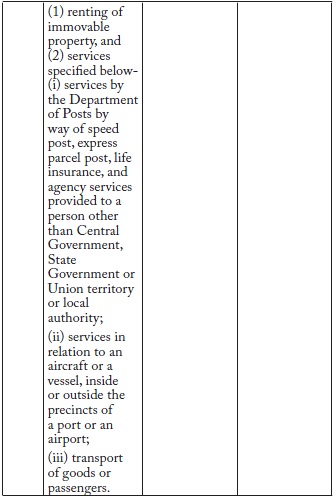
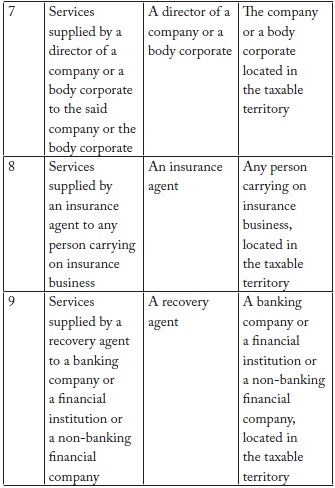
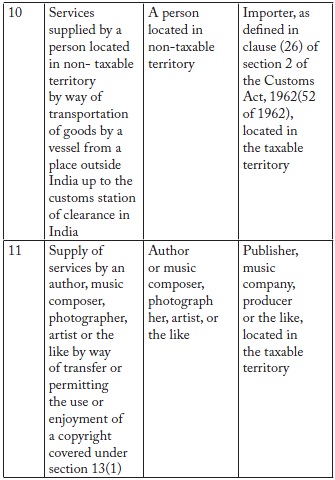
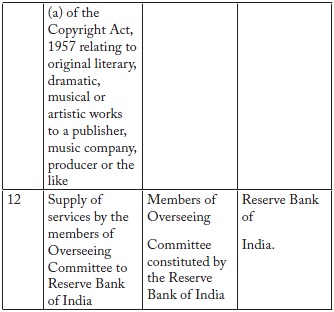
Please read related notification on http://www.cbec.gov.in
Reverse Charge under Service Tax:
In the present scenario, reverse charge mechanism is applicable in service tax for services like Insurance Agent, Manpower Supply, Goods Transport Agency, etc. Unlike Service Tax, there is no concept of partial reverse charge. The recipient has to pay 100% tax on the supply.
In the earlier government scenario, it was hard to collect service tax from the numerous unorganized sectors just similar to the goods transportation. The effort has been made to place the services as per the existing regime and Compliances and tax collections will, therefore, be increased through reverse charge mechanism. Currently, there is no reverse charge mechanism on the supply of goods so, under GST, the reverse charge may be applicable for both goods and services.
Services on which 100% Reverse charge Mechanism is applicable:
- Services by an insurance agent to any person carrying on insurance business
- Services by a recovery agent to a banking company or a financial institution or a non-banking financial company
- Services by a mutual fund agent or distributor, to a mutual fund or asset management company
- Services by a selling or marketing agent of lottery tickets to a lottery distributor or selling agent
- Services by a goods transport agency in respect of transportation of goods by road
- Services by way of sponsorship
- Services by an arbitral tribunal
- Services by individual advocate or a firm of advocates by way of legal services
- Services by a director of a company or a body corporate to the said company or the body corporate
- Services by Government or local authority by way of support services excluding,- (1) renting of immovable property, and (2) services specified in sub-clauses (i), (ii) and (iii) of clause (a) of section 66D of the Finance Act,1994
- Services by way of supply of manpower for any purpose or security services
- Import of services Services by any person who is located in a non-taxable territory and received by any person located in the taxable territory
- Services by a person involving an aggregator in any manner
Services on which Partial Reverse Charge Mechanism is applicable:
- Rent-a-cab service if Service provider is not availing abatement then Service provider is liable to pay Service tax on 50% and on rest Service receiver is liable to pay for rest under Reverse charge mechanism. However, if Service provider is availing abatement then Service receiver is liable to pay 100% of service tax payable on abated value.
- On service portion of the execution of works contract service provider is liable to pay service tax on 50% portion and on rest, service receiver is liable to pay under reverse charge mechanism.
reverse charge under gst


Permalink
Permalink
Permalink
Permalink
Permalink
Permalink
Permalink